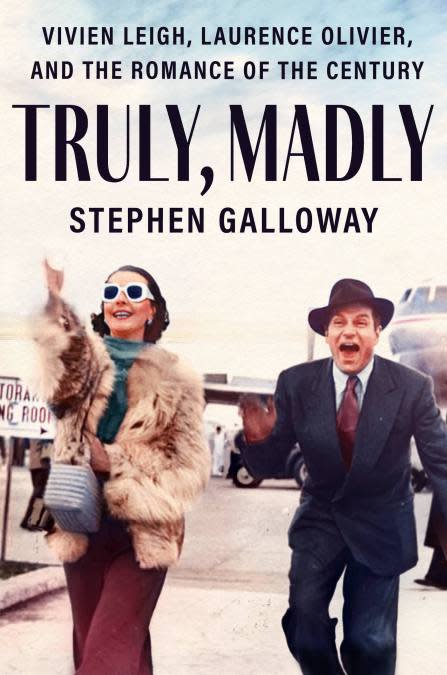'Truly, Madly': How mental illness doomed Vivien Leigh and Laurence Olivier's 'Romance of the Century'
Are legendary romances – like the one traced in Stephen Galloway's new Hollywood biography “Truly, Madly: Vivien Leigh, Laurence Olivier, and the Romance of the Century” (Grand Central Publishing, 342 pp., ★★★? out of four) – really any different from everyday ones? We needn’t be fab or famous to feel that sudden attraction, that endorphic rush of passion, the exquisite pining for the newly beloved – and then that descent into disillusion, as familiarity brews a daily cup of contempt, regret and despair.
But just as love fades, commonly, sometimes it is torn apart, dramatically. For a while, at least, it didn’t seem that Galloway’s subjects – acting royalty Sir Laurence Olivier and Vivien Leigh – were playing out a genuinely tragic love story. A necessary narcissism seems baked into the mating of superstars, after all. But in their case, a glamorous romp became an overdetermined narrative, beset by Hollywood excess and mental illness, until what began as a truly, madly adulterous affair ended in pathos as Leigh, worn down by bipolar disorder, depression and tuberculosis, died in 1967. Olivier, who lasted 22 more years, never got over her.
'A Ballad of Love and Glory': You'll be seduced by Reyna Grande’s Mexican-American War romance

Galloway, a former executive editor of the Hollywood Reporter, calls it “The Romance of the Century“ in the book’s subtitle. But that’s hard to argue in a new century prowled by movie-streamers who don’t link Leigh and Olivier to each other so much as to their iconic performances – her fiery Scarlett O’Hara in 1939’s “Gone With the Wind”; his smoldering Heathcliff that same year in “Wuthering Heights,” among many others. The romance, though, feels buried beneath mounds of Hollywood gossip and too many cross-referenced memoirs and adjacent biographies.
Galloway earnestly pulls these sources together, corroborating from multiple perspectives. The result is both compelling and frustrating – a thousand anecdotes and names swirl about the narrative, dizzyingly, yet the heart of the drama beats strongly. It is very much Leigh’s story, told most poignantly as the book narrows its scope to chronicle her decline.
20 must-read spring books: Viola Davis, Janelle Monáe, Robin Roberts, Don Winslow and more
We feel the weight of her undiagnosed mania, her tubercular weakening, her desperate, predatory sexuality as her marriage to a helpless Olivier fell apart. All of it coexisted with her brilliantly driven turns on stage and screen, culminating in Oscars not only for “Gone With the Wind” but also for a more modern archetype as the haunted, abused Blanche DuBois in “A Streetcar Named Desire.”
By contrast, Olivier emerges as a sympathetic co-dependent, but his actorly strivings, ego-driven fits (he was bitterly jealous when Leigh won her first Oscar) and white male noblesse are tiresome by now. Still, Galloway dutifully limns Olivier’s rise to “greatest living actor” status, through his performances and groundbreaking direction in filmed versions of Shakespeare’s “Henry V” and and “Hamlet,” along with memorable roles stretching into old age. Even so, the scene-stealing Sir Larry fades into the background of Leigh’s tragedy.
Galloway juggles the complex story energetically. He’s at his best when he takes a forensic approach to the relationship and to Leigh’s struggles, but he’s prone to purple prose (“Hands, lips, limbs reached for each other with an urgency neither could control”). Ultimately, we’re left to wonder how it all might have gone differently, and perhaps much better, were it not for the patriarchal straight jacket of midcentury Anglo-American culture and its stigmatizing approach to mental health. Like romances great and small, this one unraveled at the pull of personality – under pressure from within and without.
This article originally appeared on USA TODAY: Vivien Leigh and Laurence Olivier: 'Truly, Madly' traces doomed love